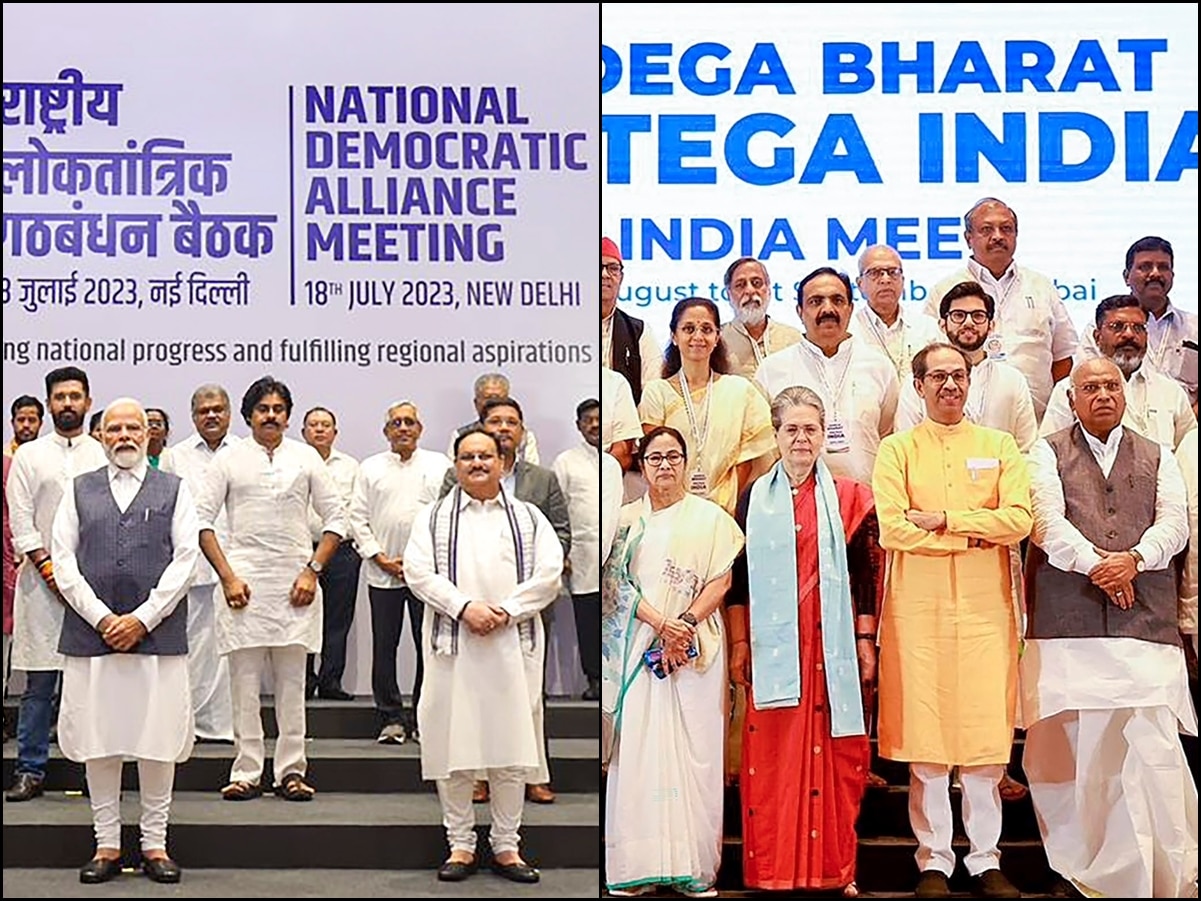As the dust settles on the recent state assembly elections in Hindi-heartland states, including Madhya Pradesh, Chhattisgarh, and Rajasthan, political parties are gearing up for the upcoming Lok Sabha elections in 2024. The ruling National Democratic Alliance (N.D.A.), led by the Bharatiya Janata Party (BJP) aims to secure a third consecutive term, while the opposition is coalescing under the banner of the Indian National Developmental Inclusive Alliance (I.N.D.I.A.) to dethrone the Narendra Modi government. Notably, parties like the YSR Congress, BJD, BSP, AIADMK, TRS, and Eknath Shinde-led Shiv Sena are currently not aligned with any major coalition.
The BJP, buoyed by recent victories in Hindi-speaking states, aspires to replicate its success in the Lok Sabha polls. However, its greatest challenge lies in southern states where the party has historically faced stronger opposition.
A recent opinion poll conducted by ABP News in association with CVoters provides insights into the potential distribution of Lok Sabha seats across different zones as well as the projected nationwide tally.
East Zone (Total 153 seats)
In the East Zone, including states like Bihar, Jharkhand, Odisha, and West Bengal, the BJP-led N.D.A. emerges stronger than the Opposition bloc in the following projection:
| Party/Alliance | Seat Range | Vote Share |
| BJP/N.D.A. | 80 to 90 | 42% |
| Congress/I.N.D.I.A+ | 50 to 60 | 38% |
| Others | 10 to 20 | 20% |
North Zone (Total 180 Seats)
The Northern states which include Haryana, Himachal Pradesh, Punjab, Rajasthan, Uttarakhand, and Uttar Pradesh appear to be supporting Prime Minister Narendra Modi's governance as the N.D.A. appears to enjoy a clear edge over the Opposition. Union territories like Jammu and Kashmir, Ladakh, Chandigarh, and Delhi are also a part of the North.
| Party/Alliance | Seat Range | Vote Share |
| BJP/N.D.A. | 150 to 160 | 50% |
| Congress/I.N.D.I.A+ | 20 to 30 | 36% |
| Others | 0 to 5 | 14% |
South Zone (Total 132 Seats)
An interesting trend is seen in the South as the region appears to be emerging as a stronghold for the I.N.D.I.A. bloc projected to receive a 40% vote share. Here, the notable aspect is also the Others emerging with 41% vote share, denoting strong regional parties that are not a part of the Opposition bloc. States like Telangana, Karnataka, Kerala, and Tamil Nadu constitute the South.
| Party/Alliance | Seat Range | Vote Share |
| BJP/N.D.A. | 20 to 30 | 19% |
| Congress/I.N.D.I.A+ | 70 to 80 | 40% |
| Others | 25 to 35 | 41% |
West Zone Party (Total 78 Seats)
The BJP is projected to receive a higher vote share (46%) in the West Zone, including Gujarat, Madhya Pradesh, and Maharashtra.
| Party/Alliance | Seat Range | Vote Share |
| BJP/N.D.A. | 45 to 55 | 46% |
| Congress/I.N.D.I.A+ | 25 to 35 | 37% |
| Others | 0 to 5 | 17% |
All India (Total 543 Seats)
As per the results of the country-wide survey, the N.D.A. is projected to cross the majority mark of 271 seats and a vote share of 42%, followed by the I.N.D.I.A. bloc at 38% share.
| Party/Alliance | Seat Range | Vote Share |
| BJP/N.D.A. | 295 to 335 | 42% |
| Congress/I.N.D.I.A+ | 165 to 205 | 38% |
| Others | 35 to 65 | 20% |
Despite BJP's dominance in the northern and western zones, the southern states pose a formidable challenge. The opposition, particularly the Congress/I.N.D.I.A.+ bloc, is banking on southern states to secure a significant number of Lok Sabha seats.
The opposition, under the I.N.D.I.A. bloc, recently held a crucial meeting in the national capital on December 19 to strategise for the upcoming elections. The bloc announced that a decision on seat-sharing arrangements across states will be reached soon and a joint campaign with mass outreach with take place. This meeting gained importance in the wake of the Congress party's setbacks in the recent state assembly polls where the BJP emerged victorious in Madhya Pradesh, Rajasthan, and Chhattisgarh.
The stage is set for a high-stakes electoral battle in 2024 as political players recalibrate their strategies and seek to shape the political landscape of the country.
[Disclaimer: Current survey findings and projections are based on CVoter Opinion Poll CATI interviews (Computer Assisted Telephone Interviewing) conducted among 18+ adults statewide, all confirmed voters, details of which are mentioned right below the projections as of today. The data is weighted to the known demographic profile of the States. Sometimes the table figures do not sum to 100 due to the effects of rounding. Our final data file has Socio-Economic profile within +/- 1% of the Demographic profile of the State. We believe this will give the closest possible trends. The sample spread is across all Assembly segments in the poll bound state. MoE is +/- 3% at macro level and +/- 5% at micro level Vote Share projection with 95% Confidence interval.]


